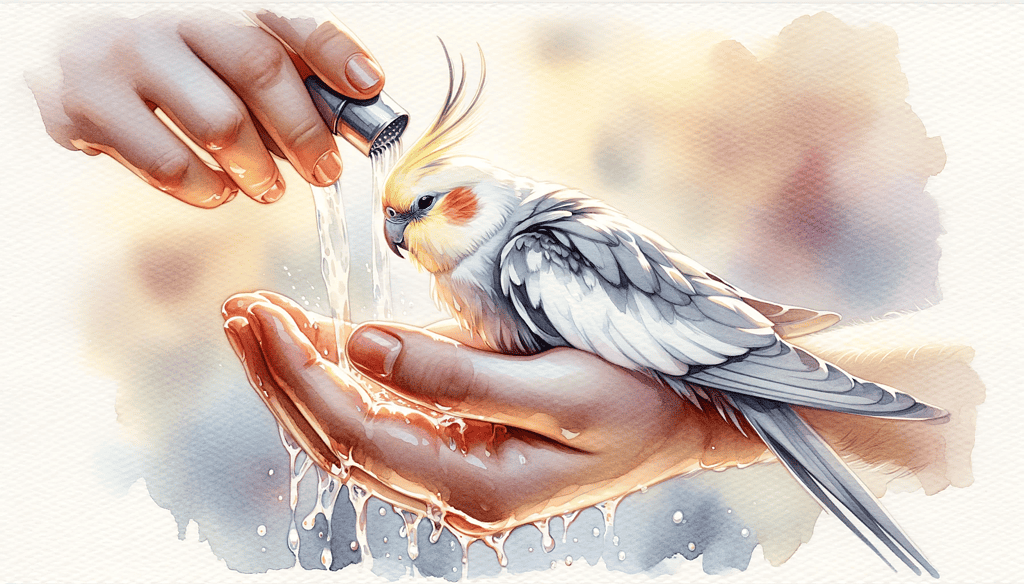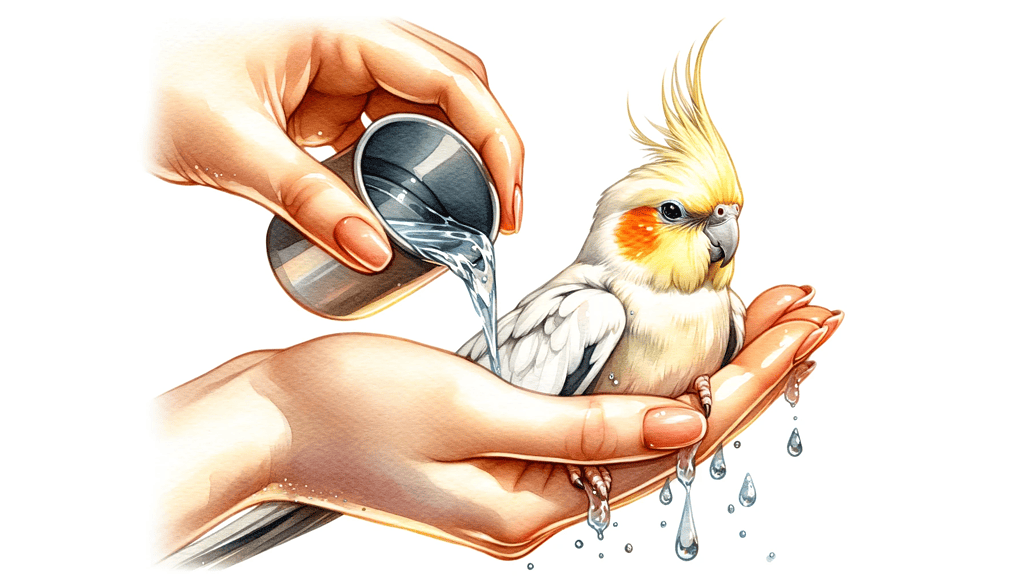
Cockatiels, with their vibrant personalities and striking appearance, have become one of the most beloved pets worldwide. But, as with any pet, proper care is essential to ensure their health and happiness. One question that often arises among cockatiel owners is: should you give them a bath?
As a general rule, bathing is beneficial for cockatiels. It not only helps in maintaining their hygiene but also aids in molting and mimics their natural behaviors. However, the frequency and method of bathing should be tailored to each bird’s individual preferences and needs.
Dive in as we explore the various bathing techniques, their pros and cons, and other alternative methods to keep your feathered friend clean and gleaming.
Reasons To Give Cockatiels A Bath
Bathing isn’t just a luxury for cockatiels; it’s a necessity. Here’s why:
- Maintaining hygiene: Just like us, cockatiels need to stay clean. Bathing helps soften dirt on their feathers and removes pollutants, ensuring they remain hygienic and free from potential infections.
- Helping with molting: Bathing softens the white keratin coating of new feathers. This not only aids in the molting process but also ensures that your bird can preen more easily, removing feather dust.
- Mimicking natural behaviors: In the wild, birds often bathe in puddles or enjoy the rain. By providing them with a chance to bathe, you’re allowing them to engage in natural behaviors, which can be both enjoyable and beneficial for them.
Risks Associated With Bathing
While bathing is beneficial, it’s not without its risks. Here are some potential concerns and how to mitigate them:
| Risks | How to Mitigate |
| Water temperature concerns | Ensure the water is lukewarm, neither too hot nor too cold. |
| Risks of drafts and rapid temperature changes | Bathe your cockatiel during the day when it’s warm and avoid placing them in drafty areas post-bath. |
| Potential for stress if not introduced properly | Introduce your cockatiel to water gradually. Don’t force or pressure them. If they’re hesitant, try different methods like misting or providing a shallow dish. |
Best Practices For Bathing Cockatiels

Having established the importance of bathing for cockatiels, the next question is: how can you ensure a safe and comfortable bathing experience for your feathered friend? Let’s dive into the best practices and techniques to make bath time a delightful experience for both you and your bird.
Choosing the Right Bathing Technique
Cockatiels, like us, have their own preferences when it comes to bathing. Over the years, I’ve observed various methods that cockatiel owners employ, each with its own set of advantages and disadvantages:
- Misting: This involves using a spray bottle to mist water over the bird. It’s a gentle method that mimics rain, which many cockatiels seem to enjoy.
- Shallow Bowls: Some cockatiels prefer splashing around in a shallow dish of water. This method allows them to have more control over the bathing process.
- Shower Perch: For those who like to shower with their birds, a shower perch can be installed. It allows the cockatiel to enjoy the water while you’re showering.
Comparison of Bathing Techniques:
| Technique | Advantages | Disadvantages |
| Misting | Mimics natural rain, gentle on the bird, easy to control. | Some birds might not get thoroughly wet. |
| Shallow Bowls | Allows bird to control the depth, can be placed inside the cage. | Risk of water spilling, might not be suitable for larger birds. |
| Shower Perch | Allows bird to enjoy a natural shower, strengthens bond with owner. | Requires training, not all birds might enjoy it. |
Alternative Methods Of Keeping Cockatiels Clean
While bathing is an essential aspect of cockatiel care, it’s not the only method to keep your feathered friend clean and healthy. Let’s explore some alternative methods that can complement the bathing routine and ensure your bird remains in top-notch condition.
1. Dust Baths
Cockatiels, originating from Australia’s arid regions, have a natural inclination towards dust baths. This unique method offers several benefits:
- Mimics Natural Behavior: Dust baths help cockatiels feel at home, replicating their natural environment.
- Cleans Feathers: The dust particles help remove dirt and excess oil from their feathers.
- Skin Health: Dust baths can also benefit their skin, preventing it from becoming too oily.
Steps for a Successful Dust Bath:
- Choose a shallow container, large enough for your cockatiel to comfortably fit.
- Fill it with a thin layer of bird-safe dust or sand.
- Place the container in a location where your bird can easily access it.
- Allow your cockatiel to enter and roll or flutter in the dust.
- Once done, gently brush off any excess dust from their feathers.
2. Regular Grooming

Grooming complements bathing and is vital for maintaining your cockatiel’s health and appearance.
Grooming Process Step by Step:
- Feather Trimming: Regularly check and trim any damaged or overgrown feathers.
- Nail Clipping: Use bird-safe clippers to keep their nails at an appropriate length.
- Beak Care: Ensure the beak remains sharp and in good condition. If it becomes overgrown, consult a vet.
- Inspecting for Parasites: Regularly check for any signs of mites or other parasites.
- General Health Check: While grooming, it’s a good opportunity to check for any abnormalities or health concerns.
3. Environmental Enrichment
Keeping your cockatiel engaged and active is another way to ensure they remain clean.
Toys and Activities Beneficial for Cockatiels:
- Chewing Toys: Helps in beak maintenance and provides mental stimulation.
- Climbing Ladders: Promotes physical activity and keeps their nails in check.
- Mirrors: Cockatiels often enjoy interacting with their reflection.
- Swings and Bells: Provides entertainment and physical exercise.
- Foraging Toys: Encourages natural searching behavior and keeps them engaged.
Conclusion
Understanding the bathing needs of cockatiels is vital for their well-being and overall health. Bathing not only ensures hygiene but also mimics their natural behaviors, making them feel more at home. As someone passionate about these delightful birds, I can’t emphasize enough the importance of ensuring their comfort during the process.
Did you find this article enlightening? I’d love to hear your thoughts in the comments below. If you believe this information could benefit other bird enthusiasts, please consider sharing the article. Let’s spread the knowledge and ensure our feathered friends receive the best care possible!
Frequently Asked Questions
How often should you bathe a cockatiel?
Ideally, once a week, but it depends on the bird’s preference and the environment.
Can cockatiels catch a cold from bathing?
Yes, if exposed to drafts or sudden temperature changes post-bath.
Why is my cockatiel afraid of water?
It could be due to a lack of exposure or a previous negative experience. Introduce them gradually.
What signs should I look for to know if my cockatiel needs a bath?
Look for behaviors like splashing in their drinking water or showing interest in water sources.
